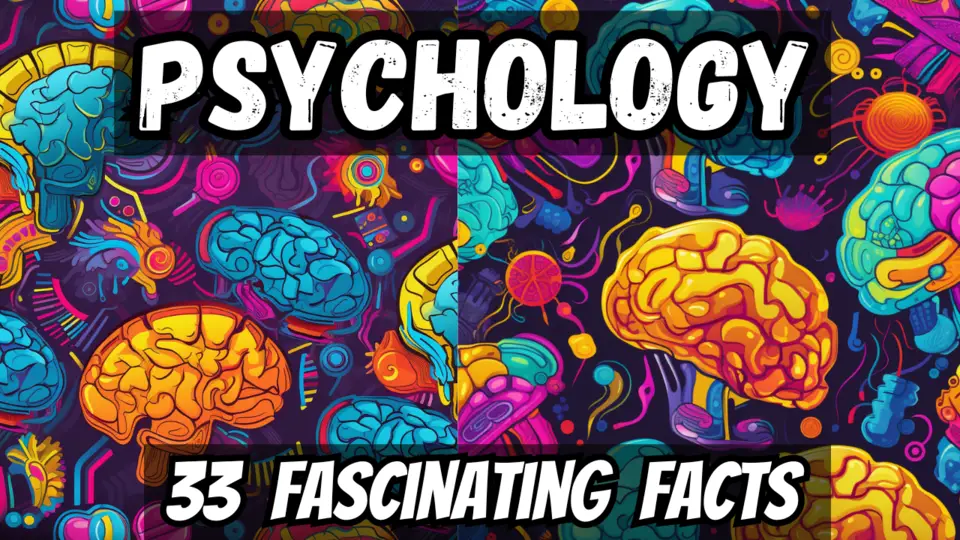The labyrinthine corridors of the human mind beckon with endless mysteries waiting to be uncovered. Psychology offers countless insights into human behavior, cognition, and emotion.
Here are 33 intriguing psychological facts that will illuminate the depths of our intricate psyche.
1. Mere Exposure Effect
The more we’re exposed to something, the more we tend to like it. This explains why a song might grow on you after repeated listens or why a familiar face becomes more likable over time.
2. Placebo Effect
Belief in the effectiveness of a treatment can sometimes lead to its perceived outcomes, even if the treatment is inactive or fake.
3. The Zeigarnik Effect
Unfinished tasks tend to dominate our thoughts more than completed ones. It’s why cliffhangers are so effective in shows.
4. Mirror Neurons
These are brain cells that react both when we perform an action and when we witness someone else perform the same action, suggesting a basis for empathy.
5. Cognitive Dissonance
We experience discomfort when holding conflicting beliefs, and we’re naturally inclined to seek consistency by changing a belief or rationalizing our actions.
6. Halo Effect
Our impression of someone can be influenced by a single trait. For instance, if someone is kind, we might also perceive them as intelligent or competent.
7. Dunning-Kruger Effect
Those with low ability at a task often overestimate their ability, while experts tend to underestimate their competence.
8. Ego Depletion
Our self-control is a finite resource that can be depleted over time, leading to decreased willpower in subsequent tasks.
9. Fundamental Attribution Error
We tend to attribute others’ behaviors to their personalities rather than external factors, but do the opposite for our own actions.
10. In-group Bias
We naturally favor those who belong to our group, whether it’s a sports team, nationality, or even a favorite color.
READ MORE: 25 Fascinating Facts About Psychology
11. Endowment Effect
People often value things more highly simply because they own them.
12. Serial Position Effect
We remember the first and last items in a list better than the middle items.
13. Peak-End Rule
Our memory of an event is heavily influenced by its most intense moment (the peak) and its end, rather than the average or entirety of the experience.
14. Rosy Retrospection
We tend to remember past events more positively than they actually were.
15. Reciprocity Norm
We feel compelled to return favors, even if we didn’t ask for them in the first place.
16. Bystander Effect
The more people present during an emergency, the less likely any individual is to help.
17. Gambler’s Fallacy
The mistaken belief that past random events can influence future ones, like thinking a coin is “due” for a tails after several heads in a row.
18. Flashbulb Memory
Vivid, detailed memories of emotionally charged and significant events, though they aren’t always 100% accurate.
19. Tip of the Tongue Phenomenon
The frustrating feeling when you know something but can’t quite recall it.
20. Priming
Exposure to one stimulus influences our response to a subsequent, related stimulus, even if we’re unaware of the connection.
READ MORE: 20 Interesting Facts About Jean Piaget’s Life & Contribution to Psychology
21. Baader-Meinhof Phenomenon
After learning something new, we start noticing it everywhere. This is also called frequency illusion.
22. Confirmation Bias
We seek and favor information that confirms our existing beliefs while ignoring contradictory data.
23. Illusory Truth Effect
Repeated exposure to false information can lead us to believe it’s true.
24. Availability Heuristic
We judge the likelihood of events based on their availability in our memories, which can be influenced by recent news or events.
25. Magical Thinking
The belief that unrelated events are causally connected despite the absence of any plausible causal link.
26. Backfire Effect
When presented with contradictory evidence, people might reinforce their pre-existing beliefs instead of changing them.
27. Somatoparaphrenia
A rare delusion where one denies ownership of a limb or side of one’s body.
28. Restorative Justice
A system of criminal justice that focuses on the rehabilitation of offenders through reconciliation with victims and the community at large.
29. Just-world Hypothesis
The belief that the world is fair and people get what they deserve, leading to victim-blaming.
30. Ostrich Effect
The tendency to avoid negative information or bad news, metaphorically burying one’s head in the sand.
READ MORE: 20 Interesting Facts About B.F. Skinner’s Life & Contribution to Psychology
31. Spacing Effect
We learn better when we space out our study sessions over time rather than cramming.
32. Hindsight Bias
After an event has occurred, we believe we would have predicted or expected it, also known as the “I-knew-it-all-along” effect.
33. Hyperbolic Discounting
Given two similar rewards, humans show a preference for one that arrives sooner rather than later, discounting the value of the later reward.
The human psyche is an intricate web of patterns, biases, and phenomena. These facts accentuate the boundless complexities and curiosities within our minds. As we continually unravel these layers, psychology remains the beacon that lights our path to understanding the very essence of what makes us, us.
Now watch the video presentation:



